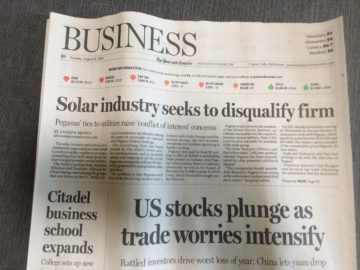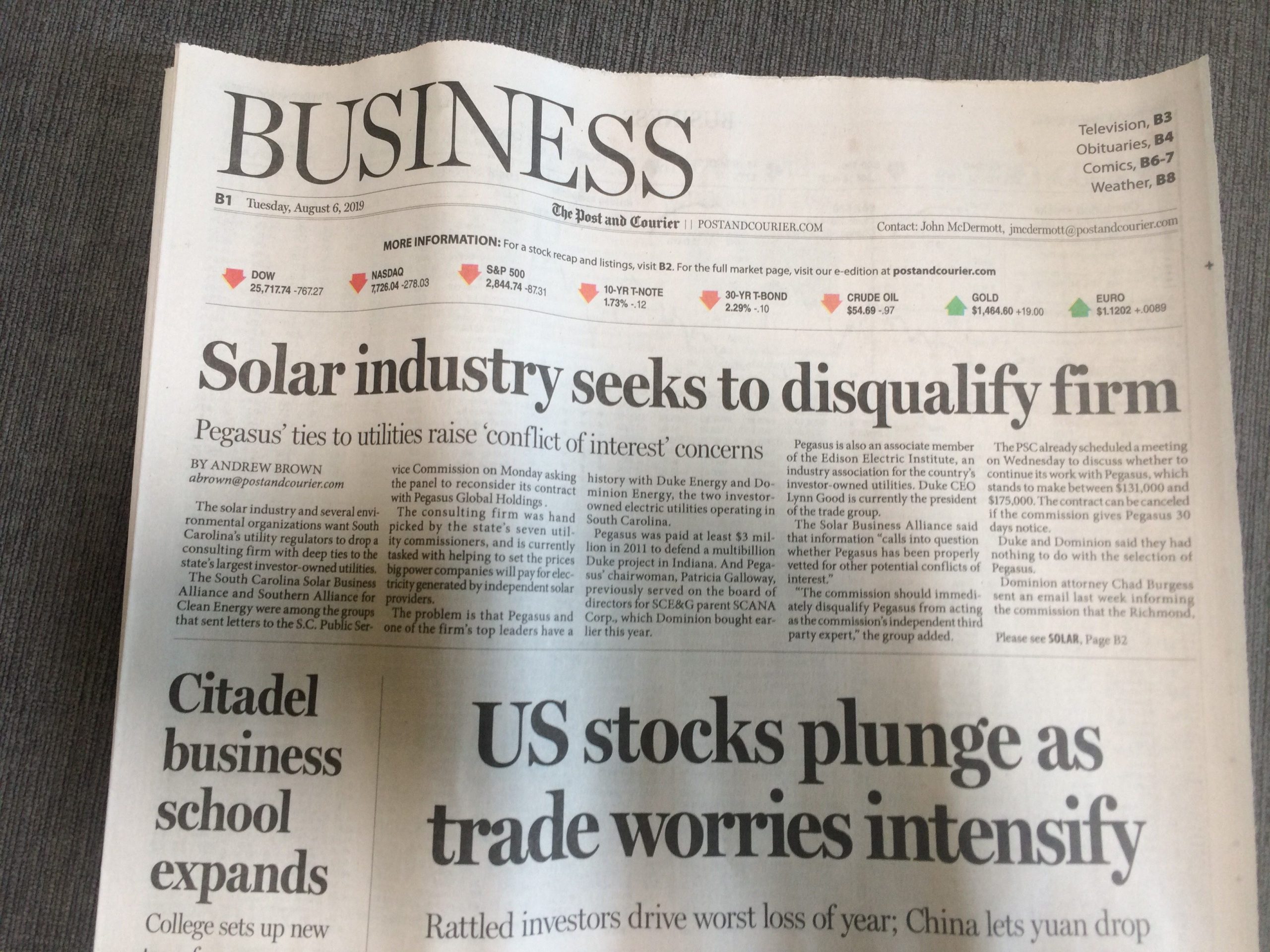UPDATE: Since our blog was published, there’s been a major shake up: Pegasus is out. Interviews for qualified and independent consultants will start Monday and will be live streamed by the PSC for transparency.
—————————-
Andrew Brown at the Post and Courier broke a story last week that the South Carolina Public Service Commission (PSC) had made an unwise — and potentially illegal — decision to hire Pegasus Global Holdings as their consultant for key upcoming “avoided cost” proceedings.
 The issue is not that they hand-picked Pegasus Global. The new law specifically exempted the Commission from the State Procurement Code in the selection and hiring of a third-party consultant. The issue is whether Pegasus Global is legitimately qualified and independent.
The issue is not that they hand-picked Pegasus Global. The new law specifically exempted the Commission from the State Procurement Code in the selection and hiring of a third-party consultant. The issue is whether Pegasus Global is legitimately qualified and independent.
SACE has shared these concerns with the South Carolina PSC and is supporting an official request for the Commission to rescind the engagement of Pegasus Global as the required third-party consultant. Southern Environmental Law Center (SELC) represents SACE in the matter and filed a letter yesterday on behalf of us and Coastal Conservation League (CCL).
 We point out in the letter that:
We point out in the letter that:
“key personnel” identified by Pegasus-Global Holdings appear to lack expertise on the avoided cost issues subject to these dockets. They do not self-identify as experts on avoided costs in their resumes or testimony before other utility commissions. Instead, they self-identify as “a management consulting firm that provides services to the utility industry.” The only mention of avoided costs in any of these peoples’ backgrounds is a paper originally published by Dr. Galloway and Dr. Nielsen in 1987 – over thirty years ago.
SACE has experience with Pegasus Global in other jurisdictions, as well and believes the South Carolina PSC should question their qualifications. They have supported a couple of Southern Company’s big bets: the budget-doubled and over 5-year delayed Plant Vogtle nuclear expansion (in GA) plus the expensive, failed experiment with “clean coal” [sic] for Plant Kemper (in MS).
In the Georgia circumstance, for example, Pegasus Global has been listed as far back as the Vogtle Certification docket that began in 2008 and was approved by the PSC in 2009. And they have been involved as recently as the 17th Vogtle Construction Monitoring docket (VCM17), when the troubled project faced a “go, no-go” vote that the Commission approved in December 2017.
This is the firm that examined the engineering, procurement and construction (EPC) contract for Plant Vogtle units 3 & 4. An excerpt below:
Based upon Pegasus-Global’s review of the EPC Agreement, review of the March 1987 independent prudence review of Vogtle Units 1 and 2, analysis of the evolution of the nuclear regulatory process since completion of Vogtle Units 1 and 2, and its experience with the U.S. nuclear industry since the early 1970s, Pegasus-Global has concluded that the Vogtle Units 3 and 4 EPC Agreement is a key element in mitigating the potential for the cost growth that Georgia Power and the other Co-owners experienced in the design, procurement and construction of Vogtle Units 1 and 2. [emphasis added]
Well that EPC Agreement certainly did not mitigate the cost-overruns and schedule delays. In fact, with the Westinghouse bankruptcy, Southern Company has assumed the role themselves. Now more than 5-years delayed and billions of dollars over-budget, the Georgia PSC staff has recently questioned even the rebaselined schedule.
This also gets toward the independence issue. Pegasus Global’s client list (https://www.pegasus-global.com/our-firm/) is almost exclusively major electric utilities. The Energy Freedom Act, that passed unanimously in both chambers this year, requires the PSC to hire…
“a qualified independent third party to submit a report that includes the third party’s independently derived conclusions as to that third party’s opinion of each utility’s calculation of avoided costs for purposes of proceedings conducted pursuant to this section.“
As Brown points out in his Post and Courier article, “Pegasus received at least $3 million from Duke Energy in 2011 to defend the utility’s handling of a multibillion-dollar coal-gasification project in Indiana.” This was also flagged by Associated Press at the time.
There is sufficient evidence that Pegasus Global should be disqualified as the South Carolina PSC consultant based on both their lack of qualifications and independence for these important proceedings that will have lasting influence on South Carolina’s energy sector.



